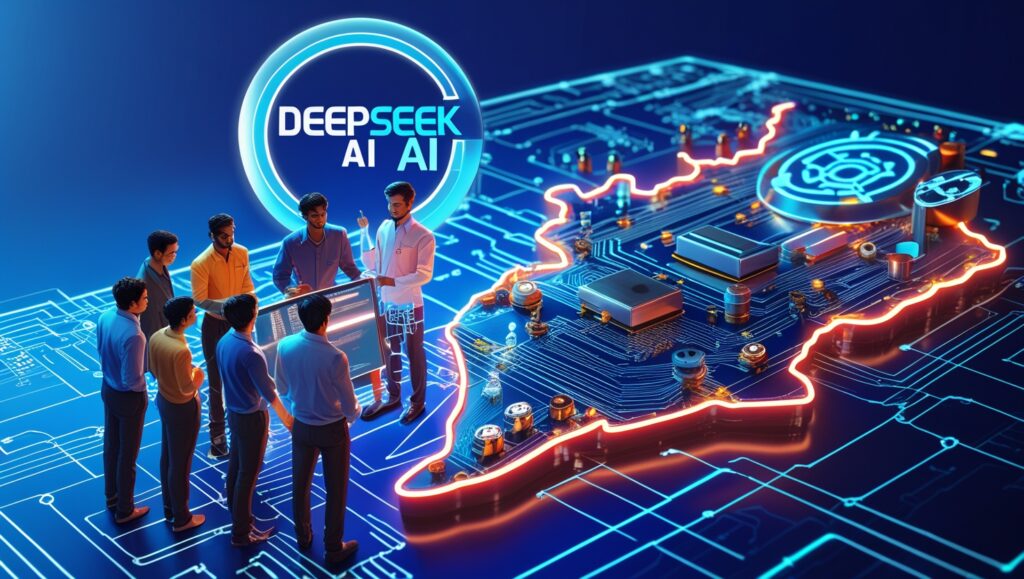DeepSeek AI represents the pinnacle of generative AI, capable of understanding and generating human-like text, solving complex problems, and revolutionizing multiple sectors. The question arises: Can India develop its own DeepSeek AI? While India has the talent and ambition, it must overcome substantial challenges and leverage unique opportunities to achieve this goal.
The Growing AI Ecosystem in India
India has emerged as a global hub for AI research and development, with numerous startups, government initiatives, and academic institutions investing heavily in AI. Some key factors that support India’s AI ambitions include:
1. Strong Talent Pool
India produces thousands of AI and machine learning (ML) experts every year, with prestigious institutions like IITs, IISc, and IIITs leading the way. Companies like TCS, Infosys, and Wipro have also invested in AI research and upskilling their workforce.
2. Government Initiatives
The Indian government has launched programs such as India AI, National AI Strategy, and Digital India to promote AI research, innovation, and adoption. The establishment of AI research centers and policies encouraging startups provides a strong foundation.
3. Expanding AI Startups & Industry Collaborations
India’s startup ecosystem is booming, with AI-focused companies like Fractal Analytics, Mad Street Den, and CropIn driving AI innovation. Collaborations between academia and industry can accelerate the development of advanced AI models.
4. Large-Scale Data Availability
India’s vast population and digital growth provide access to large-scale datasets essential for training AI models. The increasing adoption of digital payments, online services, and e-governance further enhances data-driven AI development.

Challenges in Developing DeepSeek AI in India
Despite these advantages, several challenges must be addressed to build a powerful AI model like DeepSeek AI.
1. Computational Power & Infrastructure
Developing large-scale AI models requires high-performance computing (HPC) infrastructure, GPUs, and TPUs. India’s AI infrastructure is still developing, and there is a significant gap compared to global leaders like the US and China.
2. Data Privacy & Regulation Issues
AI development requires vast amounts of data, but India’s data privacy regulations, such as the Digital Personal Data Protection (DPDP) Act, impose restrictions on data collection and processing. Ensuring compliance while accessing quality datasets is a challenge.
3. Funding & Investment Gaps
Building and training AI models like DeepSeek AI require massive investments. While India has seen increased AI funding, it still lags behind global AI giants like OpenAI, Google DeepMind, and China’s Baidu, which have billions in AI R&D budgets.
4. Brain Drain & Talent Retention
Many of India’s top AI researchers and engineers migrate to countries offering better research facilities and salaries. Retaining talent and fostering an environment for AI innovation remains a significant hurdle.
5. Ethical & Bias Concerns
AI models must be fair, unbiased, and ethically developed. India’s diverse population presents challenges in ensuring AI models are inclusive, free from bias, and aligned with ethical standards.
Opportunities for India to Develop DeepSeek AI
To overcome these challenges, India must capitalize on its strengths and implement strategic measures to develop its own DeepSeek AI.
1. Investment in AI Infrastructure
The Indian government and private sector must invest heavily in HPC, data centers, and AI supercomputing facilities to support large-scale AI model training. Public-private partnerships can accelerate infrastructure growth.
2. Strengthening AI Research & Collaboration
India needs to enhance research collaborations between academia, industry, and global AI communities. Establishing AI research labs, similar to OpenAI or DeepMind, will drive innovation.
3. Developing Open-Source AI Models
India can lead the way in open-source AI by creating indigenous AI models that are transparent, accessible, and tailored to local needs. Government-funded AI initiatives can support open-source AI development.
4. Attracting & Retaining AI Talent
Offering competitive salaries, funding AI startups, and providing world-class research facilities can help India retain its AI talent. Programs encouraging AI professionals to return to India should be prioritized.
5. Leveraging India’s Unique Data Ecosystem
India’s diverse linguistic and cultural landscape offers a unique opportunity to develop AI models with multilingual and culturally aware capabilities, giving India a competitive edge in global AI development.
India has the potential to develop its own DeepSeek AI, but it must address key challenges, including infrastructure, funding, and talent retention. By leveraging government initiatives, strengthening AI research, and investing in cutting-edge infrastructure, India can position itself as a global AI leader. With the right strategy, India can not only develop DeepSeek AI but also drive AI innovation on a global scale.


